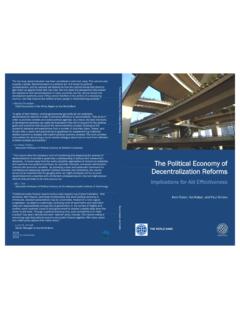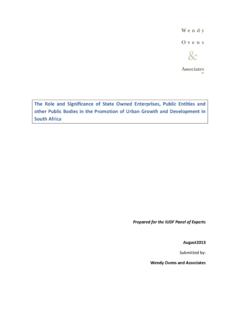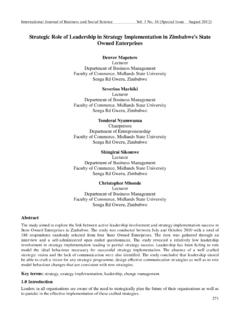Transcription of Agency Theory and Executive Compensation: The Case of ...
1 1 Agency Theory and Executive compensation : The Case of Chinese State- owned Enterprises Taye Mengistae Development Research Group The World Bank Lixin Colin Xu* Development Research Group The World Bank Corresponding Author: Lixin Colin Xu MC 3-300 DECRG, The World Bank 1818 H Street, Washington, DC 20433 Phone: (202) 473-4664 Fax: (202) 522-1155 Email: * We thank Chong-En Bai for useful discussions, and Canice Prendergast (the editor) and two anonymous referees for constructive comments. Colin Xu also acknowledges the influence of Sherwin Rosen in spurring his interest in Executive compensation . The data set was kindly provided by the Chinese Academy of Social Science (CASS) and was the result of a survey carried out by the Institute of Economics of the CASS in collaboration with economists from the University of Michigan, University of California, San Diego and Oxford University.
2 Financial support from the Ford Foundation to organizing the data set is gratefully acknowledged. 2 Agency Theory and Executive compensation : The Case of Chinese State- owned Enterprises Abstract. This paper examines the extent to which Agency Theory may explain CEO compensation in state- owned enterprises (SOEs) in China during the 1980s. We find that the sensitivity of CEO pay to firm performance decreases with the variance of performance. This is consistent with the prediction of a tradeoff between incentives and insurance in Agency Theory . On the other hand, the data lend little support to the relative performance evaluation hypothesis. We also find that the performance sensitivity of CEO pay increases with the marginal return to Executive action, that is, pay sensitivity increases with managerial control rights, worker incentives, profit retention rates of firms, and the degree of product market competition faced by the firm.
3 While the elasticity of pay to sales is slightly smaller than that found in the literature on conventional firms in the West generally, our estimate of the semi-elasticity of pay with respect to profitability is comparable to estimates for regulated industries in the United States. JEL codes: D2, G3, J3, L2, L3, P5. Key words: CEO compensation , Agency Theory , relative performance model, SOEs, China. 3I. Introduction The large and growing body of empirical work on the economics of managerial compensation is mostly based on the theme of aligning the interest of corporate executives with that of shareholders. However, among the papers that formally test predictions of standard models of Agency , only half a dozen or so are concerned with insurance-incentives tradeoffs in compensation These include, for example, Aggarwal and Samwick (1999), which analyzes a large data set from 1500 companies and find strong evidence of pay schemes trading off the provision of incentives against the allocation of performance risk: not only does Executive pay increase in firm performance, but pay-performance sensitivity also decreases in the variance of performance.
4 This evidence is supported by results of Garen (1994) and Lambert and Lacker (1987), but happens to be contradicted by, for example, Core and Guay (1998), Bushman et al. (1996), and Yermack (1995), which find little evidence in their data favoring the incentive-insurance tradeoff hypothesis. A part of the literature is also concerned with a second aspect of Agency Theory , namely, the relative performance evaluation hypothesis. Here too the evidence is rather mixed: while most studies do not support the hypothesis, there are notable 1 See Rosen (1992), Murphy (1999), Lazear (1999), Abowd and Kaplan (1999) and Prendergast (1999) for surveys in this topic. In our view the main achievement of the literature so far is the consensus that Executive earnings increase with corporate performance ( , Jensen and Murphy, 1990; Garen, 1994; Kaplan, 1994; Baker and Hall, 1998; Hall and Liebman, 1998; and Aggrawal and Samwick, 1999).
5 There is also substantial evidence that managers respond to pay incentives, that is, greater current pay-performance sensitivity leads to subsequent improvement in corporate performance ( , Masson, 1971; Abowd, 1990; Leonard, 1990). Although the first of these findings is consistent with the Agency Theory , it is by no means a unique prediction of the Theory . As Prendergast (1999) notes, observed responsiveness of managers to incentives vindicates a premise, rather than an implication, of Agency models. 2 The studies failing to find evidence of relative performance evaluation are Barro and Barro (1990), Janakariman et al. (1992), Garen (1994), Aggarwal and Samwick (1999). Two exceptions are Gibbons and Murphy (1990), and Antle and Smith (1986). Gibbons and Murphy (1990) find that, while the rate of growth of pay increases in shareholder rate of return, it also decreases in the market rate of return, which is consistent with the use of relative performance evaluation in pay determination.
6 Empirical studies of CEO compensation conducted within the conceptual framework of Agency Theory but not concerned with testing implications considered here include Agrawal and Koeneber (1998) on the effect of the threat of takeover 4 Also motivating this paper is the fact that the two key predictions of the Agency Theory have mainly been tested on compensation data drawn from Western corporations only. In order to examine the extent to which the Agency Theory may explain CEO compensation in other contexts, the paper brings the predictions against data on CEO compensation in commercialized State- owned enterprises (SOEs) in China in the 1980s. It also assesses the relationship between the marginal productivity of Executive action and the sensitivity of CEO pay to firm-performance. There are striking and important differences between the typical SOE in China and large US corporations that have a bearing on Executive compensation .
7 The two institutions nonetheless share features that seem to generate the same Agency problems. First, ownership is clearly separated from control, and the owner-versus- Executive relationship seems to exhibits informational asymmetry of the same nature in the two institutions. Second, the local government which typically owns the Chinese SOE appears to seek the maximization of the value of the enterprise following the reforms of the late 1970s and early 1980s. Third, both institutions seem to obtain and reward management services through a managerial labor market (Groves at al. 1995). Our data consist of a ten-year panel of observations on managerial compensation and corporate performance on approximately 400 SOEs, drawn from a survey carried out by the Chinese Academy of Social Sciences (CASS).
8 3 Our analysis implies that the performance sensitivity of the CEO pay decreases with the variance of performance. on compensation , Core, Holthausen and Larcker (1999) on the effect of governance structures, Bliss and Rosen (2001) on the effect of mergers and acquisitions, and Perry and Zenner (2001) about the effects of regulation on CEO pay level and pay sensitivity. On a methodological theme, Hermalin and Wallace (2001) question the assumption of uniform pay-performance sensitivity that is made in practically all existing empirical work on managerial compensation . See also Main, O Reilly, and Wade (1993), Kaplan (1994), Kole (1997), Bognanno (2001), Eriksson (1999), Roomkin and Weisbrod (1999), and Lindbeck and Snower (2000).
9 3 Other users of the data set include Groves et al (1994, 1995), Li (1997), Xu (2000), and Shirley and Xu (2001). 5 However, the evidence for relative performance evaluation is rather weak. The coefficient of average industry performance in the CEO pay equation is never statistically significant, and has the wrong sign when CEO fixed effects are controlled for. One of the advantages of the CASS survey is that it captured enterprises at different stages of the implementation of China s industrial reforms. This enables us to assess the impact of individual reforms on CEO pay sensitivity. The significance of this for the Agency Theory is that it allows us to examine whether CEO pay sensitivity increases in the marginal productivity of Executive actions. For example, increase in the marginal profit retention rate was one of the major reform measures through which authorities sought to improve firm incentives.
10 Other things being equal, such a measure would increase the resources controlled by management. The marginal productivity of Executive action would rise consequently. This in turn would raise the performance sensitivity of the CEO pay, which is indeed what we detect in the data. We also find that the performance sensitivity of the CEO pay is larger the more competitive is the product market in which the firm operates. This too is consistent with CEO pay sensitivity decreasing with the variance of performance, which is expected to be lower for firms facing greater competitive pressure. The semi-elasticity of CEO pay with respect to profitability that we estimate hovers around and ranges from (for firms facing the highest performance risk) to (for the lowest-risk firms). The average is almost as high as that found in regulated firms in the United States as documented by Joskow, Rose and Shepard (1993), in which the semi-elasticity estimates of pay with respect to accounting return range from to Before delving into details of our findings we will set out the context of our data by describing the managerial labor market of Chinese SOEs briefly, the industrial reforms which gave rise to it, and the relationship between SOEs and local governments 6as their owners.
















